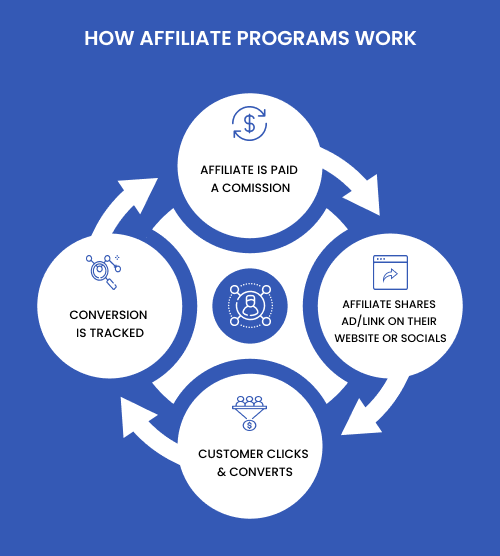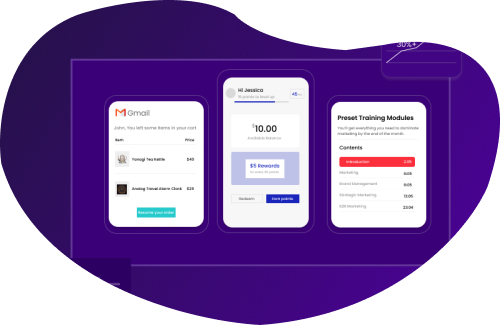In the wise words of Dominic Cummins, entrepreneur, and leadership coach, businesses aren’t B2B or B2C, they are H2H, meaning human to human. I so loved this statement because, in the direct selling business where human-centricity matters more than the business itself, this quote is so relevant, prominent, and the most fitting. Despite innovations and high-tech features being integrated into businesses, an alternate strategy to replace people-oriented marketing models like the affiliate model is still not found.
The direct selling industry since time immemorial has focused on disseminating their business through referral and affiliate model. When a customer benefits from a brand through any of its products or services, it’s a common human tendency to tell his/her friends, colleagues, or relatives about the same. The same would be the case with adverse or bad experiences as well. With the vast number of opportunities to share what someone thinks over mobile phones and the internet, the intensity and momentum at which this news is spread across are quite high. That said, let me guide you through the basics, to the scope of the affiliate business model and how it is still a trendsetter in the direct selling industry.
Direct Selling News published a study on Direct Sales Generational Engagement which noted that younger millennials (about 56%) are more interested in affiliate marketing. The scores of other generations runs thus, 42% of Gen Z, 40% of older millennials, and 38% of Gen X.
Understanding the affiliate marketing model
The momentum at which light travels over any obstruction is what makes it faster than sound. Similarly, what travels faster than facts and figures are grapevines and scuttle buttons because word of mouth can spread like wildfire no matter what obstructions come midway. This very power of spreading words through people rather than any other medium or channel is leveraged to the maximum no matter how much digitality and technological advancements occur. So, what exactly is affiliate marketing?
Affiliate marketing is a marketing model where direct selling companies or any businesses make use of their connections or affiliates by giving them a certain commission for referring to their services or products. This could help expand the business to more untapped markets and generate quality leads.
The global affiliate market is estimated to exceed a market size of $36,902 million by 2030. This indicates an estimated CAGR of 7.7% from 2022 to 2030.
Businesses offer affiliates a commission when they refer customers to their products or services. Businesses generate revenue that they couldn’t have reached otherwise, and affiliates make money on something they are already using or sharing. Affiliates can be called catalysts who fasten the business process by expediting sales and connecting with customers faster and wider.

The 80/20 rule in affiliate marketing
In a business scenario, the 80/20 rule could be investing 20% and generating revenue equivalent to 80%, which means smaller input and bigger output. Applying this rule in the affiliate marketing model will ideally look like producing 80% of sales from 20% of affiliate partnerships. This would help brands understand the contributions made by each affiliate and strategize their way forward with low-performing affiliates whether to retain them and drain your marketing budget or efficiently train them to perform well. Your affiliate sales will be directly proportional to your affiliate performance and hence, identifying low performers from a very early stage would heavily reflect on the business.
But how to effectively make use of this 80/20 rule with your affiliates?
- Efficient tracking system to monitor conversions and identity to performing affiliates
- Encourage top performers with suitable rewards and benefits
- Combine promotional resources such as coupon codes, discounts, giveaways, etc. with affiliates to magnify brand awareness and thus improve sales
Through rigorous market research, identifying what works best in which market is the first thing to do. Planning region-specific, customer-centric strategies with affiliates would generate better and faster results without weighing much on your budget.
Affiliate marketing vs influencer marketing
Oh yes, that might sound like a typewriter and computer, where one is the legacy model and the other is the most modern one. I beg to differ. Affiliate marketing to me is just as easy and simple as telling my friend my humble opinion about a product or service and getting her to purchase the same by letting her know how useful or helpful it would be for her. Whereas influencer marketing is all pomp and fancy. I must find an influencer who is influential enough, their personality must match my brand value, I must pay them a bomb upfront no matter if it reflects on my sales or not and, and, and…
Whereas, with affiliate marketing, I know where my business would go, what should be expected, pay only for the results, and remove low performers if they don’t add value to my business. As simple as that.
Of course, each marketing model has its pros and cons. Influencer marketing models could deliver the best results for the food, lifestyle, and beauty industry. It could create huge brand awareness among youngsters and frequent social media users more than an advertisement. But with affiliate marketing, businesses like direct selling have benefitted and continue to do so year after year.
| Affiliate marketing | Influencer marketing |
|---|---|
| Easily expandable to any number of affiliates or affiliate networks | Finding the ‘right’ influencer costs time and resources |
| Easy to implement | Can create brand visibility and awareness in the social space |
| Requires zero budget to begin the direct affiliate programs | Requires a huge budget to begin the program |
| Pay only for the results | Results need not be favorable |
| Easy and flexible programs | Tracking results may not be viable |
Affiliate marketing trends that can redefine direct selling future
1. Brand advocates
Most direct selling brands these days are focusing on popularizing the brand through various social media-specific strategies. With digitality taking over every legacy business strategy, creating brand advocates is a widely accepted trend to reach out to various subways in the market. With brand advocates, it does not mean an influential individual or a celebrity endorsing the brand, but active affiliates could also be brand advocates who share genuine reviews and experiences with the brand which is real feedback that instills trust and builds a positive image in the minds of prospective consumers.
2. Improved attribution models
With innovations and technological advancements, affiliate marketers are enhancing their attribution models with technologies like artificial intelligence and machine learning. Leveraging the power of data to rightly analyze and derive intense insights on customer journeys across all touch points has tremendous potential in lead generation and customer acquisition. These front-end features can maximize the results of affiliate campaigns creating maximum return on investment.
3. Mobile commerce
We wake up and sleep off on our mobile phones. Mobile commerce has seen exponential growth over the past decade. That being the case, focusing on mobile-specific campaigns could help affiliates maximize their efforts in generating leads. With responsive and replicated websites, mobile apps, and quick links to products and pages, affiliate marketing could be revolutionized.
4. Niche and micro-influencers
Affiliates could identify micro-influencers who are experts in various niches like fashion, lifestyle, health and wellness, food, entertainment, beauty, cosmetics, etc to target specific customer segments through which higher engagement rates could be created. Rather than a random influencer talking about a product that does not align with his/her skills or expertise, niche expertise could help advocate the authenticity of a brand. These micro-influencers could also help widen the affiliate network through partnerships and collaborations.
5. Diverse content
While direct selling companies still make use of blog posts and articles specific to each medium of marketing, affiliates are diversifying their content strategy by implementing the newest forms of content marketing like podcasts, videos, reels, shorts, live streaming, etc. to quickly reach their target audience across every digital platform. With interactive content, customers get to experience personalized treatments thus enhancing their rapport and relationship with the affiliates.
Find out from our customers how our solutions give MLM businesses an edge and exceed customer expectations
The new-affiliate world
As they say, change is constant. From perceptions, strategies, and technologies to everything, each day there is something new. The direct selling world is adapting these changes rapidly to create value and yield better results with their businesses. With numerous generations working in the direct selling industry, there could be differences in every aspect of the business. But what remains unchanged is the readiness of every individual in the industry despite age, demographics, or culture to imbibe these changes, devise strategies and implement them effectively into the channel. The result is a magnificent tomorrow where the industry is thriving towards success creating waves of innovations, setting newer milestones inspiring every other industry and business model.
A direct selling business enhanced its growth opportunities with the power of affiliate marketing.
Read Case Study➔








Leave your comment
Fill up and remark your valuable comment.